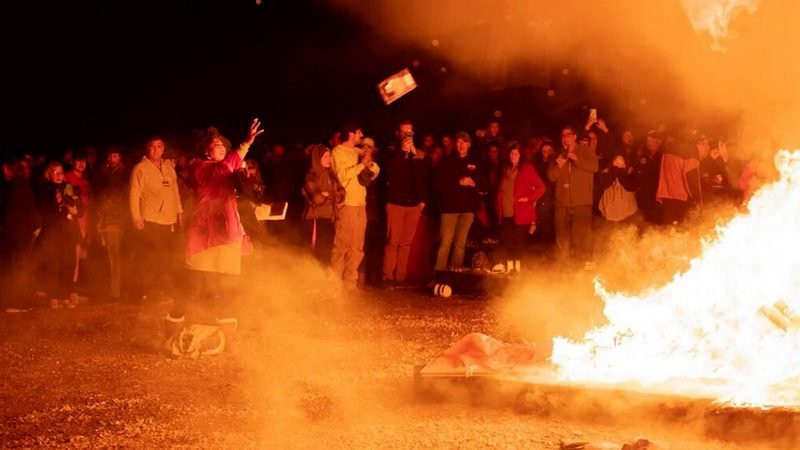
Recently, Evangelical pastor Greg Locke, pastor of Global Vision Bible Church in Juliet, Tennessee, was in the news for holding a book burning service. The Harry Potter books, Twilight books, other books, clothing, and things deemed Satanic were thrown on a pyre and burned.
In 2019, Locke burned the book “The Founding Myth: Why Christian Nationalism is Un-American” by Freedom From Religion Foundation attorney Andrew Seidel.
Those uninitiated in Evangelical thinking may view Locke’s behavior as extreme, cultic, or the actions of a man mentally sick. However, Locke’s actions have a firm grounding in the inspired, inerrant, infallible Words of God. Further, I had book burnings too back in my Independent Fundamentalist Baptist (IFB) days.
The Bible says in Acts 19:11-20:
And God wrought special miracles by the hands of Paul: So that from his body were brought unto the sick handkerchiefs or aprons, and the diseases departed from them, and the evil spirits went out of them. In certain of the vagabond Jews, exorcists, took upon them to call over them which had evil spirits the name of the Lord Jesus, saying, We adjure you by Jesus whom Paul preacheth. And there were seven sons of one Sceva, a Jew, and chief of the priests, which did so. And the evil spirit answered and said, Jesus I know, and Paul I know; but who are ye? And the man in whom the evil spirit was leaped on them, and overcame them, and prevailed against them, so that they fled out of that house naked and wounded. And this was known to all the Jews and Greeks also dwelling at Ephesus; and fear fell on them all, and the name of the Lord Jesus was magnified. And many that believed came, and confessed, and shewed their deeds. Many of them also which used curious arts brought their books together, and burned them before all men: and they counted the price of them, and found it fifty thousand pieces of silver. So mightily grew the word of God and prevailed.
In this passage of Scripture, we find the Apostle Paul coming to the city of Ephesus to preach the gospel and work miracles. All told, Paul spent two years in Ephesus. Some of the people who were saved, those who practiced the “curious arts.” Evangelical theologian Matthew Henry explains “curious arts” this way (from E-Sword):
[people who] traded in the study of magic and divination, in books of judicial astrology, casting nativities, telling fortunes, raising and laying spirits, interpreting dreams, predicting future events, and the like.
Those delivered from these practices gathered up their magic and divination books and burned them. The Bible puts the value of these books at 50,000 pieces of silver. At $20 value for each piece of silver, that’s $1 million in today’s money. Does anyone else think this valuation is embellished (Greek for a lie)?
These verses provide a Biblical foundation for Greg Locke’s book burnings, and the two book burnings performed by me in 1984 and 1987.
In 1983, I resigned from Emmanuel Baptist Church in Buckeye Lake, Ohio, moving 30 miles to the start to plant a new IFB church in the rural community of Somerset. I would go on to pastor Somerset Baptist Church for eleven years.
In 1984, convicted by the Holy Ghost over church members listening to secular rock music, I called for a book burning. I preached a scathing sermon about worldliness and the Satanic nature of modern rock music. I asked church members to go through their homes, remove any music that was dishonoring to God, and bring it to church that night so we could make a symbolic offering to God by burning them. A handful of congregants brought cassette tapes, 8-tracks, and LPs to church so they could be burned. We gathered in the side yard of the church, kindled a fire, and burned the offending items. God was pleased, and all his children said, AMEN!
Three years later, I became under increasing conviction (guilt) over “worldly” entertainment, including TV, videotapes, and music. After several Sundays of sermons, I called on church members to bring their sinful wares to church so they could be burned. Few members felt as convicted as I did. At the appointed time, we started a fire in the churchyard and gathered up the offending items so they could be burned. I wanted to make a big impression on congregants, so I planned to destroy our 13-inch television with a sledgehammer. (Please see The Preacher and His TV) Just before I hit the TV, one church member said to me (in front of everyone), “hey preacher, if you don’t want that TV, I’ll take it!” He, of course, missed the point of my recent sermons. I angrily told him NO! and then I slew our TV in the name of the thrice Holy God.
Did you ever participate in a book-burning service? Please share your experiences in the comment section.
Bruce Gerencser, 68, lives in rural Northwest Ohio with his wife of 47 years. He and his wife have six grown children and sixteen grandchildren. Bruce pastored Evangelical churches for twenty-five years in Ohio, Texas, and Michigan. Bruce left the ministry in 2005, and in 2008 he left Christianity. Bruce is now a humanist and an atheist.
Your comments are welcome and appreciated. All first-time comments are moderated. Please read the commenting rules before commenting.
You can email Bruce via the Contact Form.

